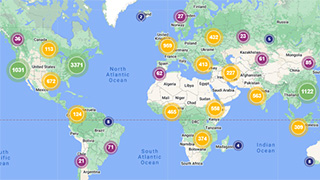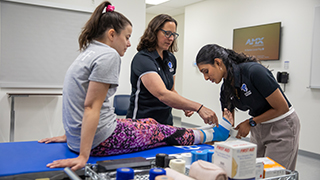Diplomacy Syllabi Collection Gets Worldwide Attention through SHU's eRepository for Recruitment and Student Support - Seton Hall University
Monday, December 5, 2022

View global downloads for Diplomacy syllabi.
This is the first in a series of articles about SHU’s eRepository, a publishing service offered by the Seton Hall University Libraries and Seton Hall Law for preservation and dissemination of SHU scholarly works. University Libraries faculty and staff manage this service which includes faculty profiles, SHU’s electronic theses and dissertations, and undergraduate research projects.
The School of Diplomacy and International Relations proposed a syllabi project 3 years ago. There was a need to eliminate paper in the college’s administrative offices as well as have electronic records for course syllabi. Susan Malcolm, Secretary for Diplomacy has been instrumental in moving this project forward each semester. To date, 670 graduate and undergraduate diplomacy course syllabi from as far back as the Spring 2000 term to the present are publicly available for viewing and download in Seton Hall’s eRepository.

Global reach of Diplomacy syllabi in SHU's eRepository.
The establishment of this collection allows Diplomacy Syllabi to be available globally with live activity shown here. This week, a reader from Ethiopia is viewing Professor Nabeela Alam’s syllabus for Comparative Political Economy of Development. Another reader in Jakarta, Indonesia is looking at Dr. Ann Marie Murphy’s International Relations of Southeast Asia course. Lastly, someone is reading Assefaw Bariagaber’s syllabus for the International Relations of African States course in Hong Kong.
Importantly, the syllabi collection is also used for recruitment efforts at the School of Diplomacy. Catherine Ruby, Ph.D. Assistant Dean of Graduate Enrollment Management, confirms "the syllabi repository is a wonderful addition to our recruitment plan, particularly for deposited and registered graduate students. We had an onboarding session last week for those fall 22 students and included the link to the syllabi." Ruby also shares "graduate students are asking, 'What can I do before I come, to prepare for the program?' I advise them to look at the syllabi."
Faculty can use archived syllabi to develop new courses or as reference resources for courses they have never taught before. Graduates of the School of Diplomacy can use these syllabi to support their resumes and job applications through the documentation of previous course content, which demonstrates their understanding of relevant topics. Meanwhile, researchers can use the syllabi to document trends in diplomacy education over time.
The syllabi have collectively been downloaded over 15,000 times since going live in late 2020 with 60% occurring in the past year. Faculty can use these statistics for promotion and tenure reports, grant or book proposals or for school or departmental accreditation.
1,077 institutions in 169 countries have viewed the Diplomacy Syllabi Collection. Syllabi have been downloaded over 15,000 times in the countries below and more.
| Country | Downloads |
| United States | 6594 |
| China | 801 |
| India | 460 |
| United Kingdom | 429 |
| Nigeria | 426 |
| Russian Federation | 365 |
| Kenya | 346 |
| Ethiopia | 312 |
| Philippines | 307 |
| Canada | 272 |
| Pakistan | 257 |
| Total | 15,219 |
PlumX Metrics (a new option for scholarly output metrics) show approximately 15,000 downloads and 9,400 abstract views.
Please contact erepository@shu.edu if you have a collection you would like to add to the eRepository.
Categories: Education, Nation and World, Research






